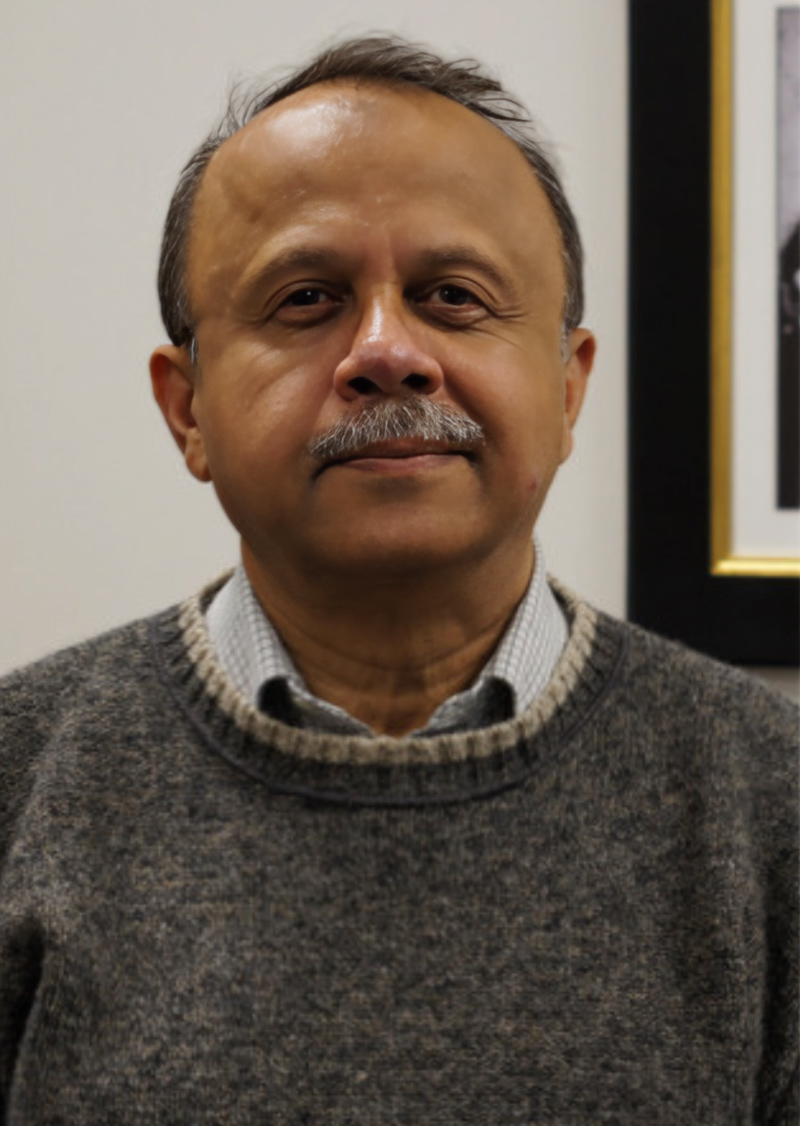
Ashok S. Bhagwat
Professor
313-577-2547
313-577-8822 (fax)
Chem 443
Website(s)
Department
Ashok S. Bhagwat
Research interest(s)/area of expertise
Mechanisms of DNA damage and repair, nucleic acid biochemistry, carcinogenesis, generation of antibody diversity
Research
The research in our group is focused on elucidating DNA damage caused by endogenous reactive chemical species, DNA methylation, and cellular processes such as transcription, replication, and cytosine deamination due to human AID/APOBEC enzymes that promote mutations. Cells also express proteins that counteract these potentially hazardous processes by preventing DNA damage or repairing the damage. We aim to understand the interplay between these opposing forces to explain molecular mechanisms that allow cells to diversify and tailor antibodies to counteract infectious agents and respond to viral infections. We are also interested in explaining how these processes may also drive carcinogenesis by causing mutations and using this understanding to find anticancer treatments.
Education
- B.Sc., University of Bombay, 1972
- M.Sc. Indian Institute of Technology, 1974
- Ph.D., Pennsylvania State University, 1982
- Postdoctoral Fellow, Cold Spring Harbor Laboratory, 1982-1987
Selected publications
- Conner KL, Shaik AN, Marshall KA, Floyd AM, Ekinci E, Lindquist J, Sawant A, Lei W, Adolph MB, Chelico L, Siriwardena SU, Bhagwat A, Kim S, Cote ML, Patrick SM. APOBEC3 enzymes mediate efficacy of cisplatin and are epistatic with base excision repair and mismatch repair in platinum response. NAR Cancer. 2020 Dec;2(4):zcaa033. doi: 10.1093/narcan/zcaa033. Epub 2020 Nov 6. PMID: 33196045; PMCID: PMC7646253
- Stewart JA, Schauer G, Bhagwat AS. Visualization of uracils created by APOBEC3A using UdgX shows colocalization with RPA at stalled replication forks. Nucleic Acids Res. 2020 Nov 18;48(20):e118. doi: 10.1093/nar/gkaa845. PMID: 33074285; PMCID: PMC7672425
- Stewart JA, Holland TC, Bhagwat AS. Human Herpes Simplex Virus-1 depletes APOBEC3A from nuclei. Virology. 2019 Nov;537:104-109. doi: 10.1016/j.virol.2019.08.012. Epub 2019 Aug 13. PMID: 31493648; PMCID: PMC6901759
- Sakhtemani R, Senevirathne V, Stewart J, Perera MLW, Pique-Regi R, Lawrence MS, Bhagwat AS. Genome-wide mapping of regions preferentially targeted by the human DNA-cytosine deaminase APOBEC3A using uracil-DNA pulldown and sequencing. J Biol Chem. 2019 Oct 11;294(41):15037-15051. doi: 10.1074/jbc.RA119.008053. Epub 2019 Aug 19. PMID: 31431505; PMCID: PMC6791317
- Siriwardena SU, Perera MLW, Senevirathne V, Stewart J, Bhagwat AS. A Tumor- Promoting Phorbol Ester Causes a Large Increase in APOBEC3A Expression and a Moderate Increase in APOBEC3B Expression in a Normal Human Keratinocyte Cell Line without Increasing Genomic Uracils. Mol Cell Biol. 2018 Dec 11;39(1):e00238-18. doi: 10.1128/MCB.00238-18. PMID: 30348839; PMCID: PMC6290372
- Owiti N, Wei S, Bhagwat AS, Kim N. Unscheduled DNA synthesis leads to elevated uracil residues at highly transcribed genomic loci in Saccharomyces cerevisiae. PLoS Genet. 2018 Jul 17;14(7):e1007516. doi: 10.1371/journal.pgen.1007516. PMID: 30016327; PMCID: PMC6063437
- Wei S, Perera MLW, Sakhtemani R, Bhagwat AS. A novel class of chemicals that react with abasic sites in DNA and specifically kill B cell cancers. PLoS One. 2017 Sep 19;12(9):e0185010. doi: 10.1371/journal.pone.0185010. PMID: 28926604; PMCID: PMC5605088
- Siriwardena SU, Chen K, Bhagwat AS. Functions and Malfunctions of Mammalian DNA-Cytosine Deaminases. Chem Rev. 2016 Oct 26;116(20):12688-12710. doi: 10.1021/acs.chemrev.6b00296. Epub 2016 Sep 1. PMID: 27585283; PMCID: PMC5528147